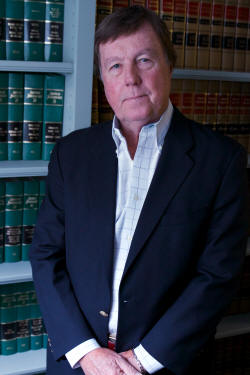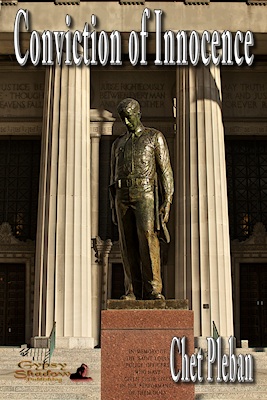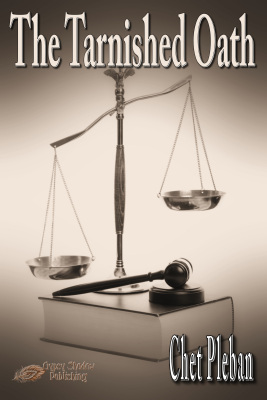Chet Pleban

|
For the past 40 years, Chet Pleban has spent his days in a
courtroom talking to juries, trying to convince them that his
client was right and the opposition wrong. Many of his clients
are police officers who find themselves on the wrong side of
the law. In addition to representing people accused of criminal
acts, he also represents those who suffered serious injuries
and whose employment was wrongfully terminated. For the most
part, he has spent his career representing the underdog and
fighting big government or large corporations. Many of his
cases are high profile. He is embraced by the media and
despised by his opponents. Repeatedly, people would tell him,
“Your cases are so interesting, you should write a book.” So,
he did.
Conviction of Innocence was a three year project that he wrote
while spending the winter months in Florida away from not only
the St. Louis weather but also the demands of a busy law
practice. Prior to this work, his writing experience included
appellate briefs and court memoranda. There are those,
including some judges, who would say that is where he got his
start writing fiction.
While continuing to write during the Florida winters, Pleban
divides his time during the summer months between his home in
St. Louis where he continues in the active practice of law and
his summer home at the Lake of the Ozarks. Additionally, he
enjoys his three children, Mimi and Jake who live in Chicago,
and J.C., the oldest, who also practices law in St. Louis. In
particular, an African safari with his daughter and golf trip
to St. Andrews in Scotland with his two sons, were some of the
most enjoyable and memorable times of his life.
WEBSITE: http://www.convictionofinnocencebook.com
TWITTER: https://twitter.com/ChetPleban
FACEBOOK:
https://www.facebook.com/profile.php?id=100004256177967
Congratulations for placing in the top ten in the 2014
Preditors and Editors Readers Poll in the Mystery Category!
 |
New Title(s) from Chet Pleban



Order Conviction of Innocence in Print Today!
Order The Tarnished Oath in Print Today!
Order The Victims of Innocence in Print Today!
Click on the thumbnail(s) above to learn more about the book(s) listed.

|
Bobby Decker, a white police officer,
arrests a young black burglary suspect one chilly spring night,
but can’t explain how the suspect’s skull was fractured. The
elected prosecutor with aspirations of a judicial appointment,
claims Decker smashed his skull with a flashlight. Black
activists, still critical of that prosecutor’s recent failure to
convict a white police sergeant for the brutal beating of a
mentally challenged young man in his own home, sees this as yet
another case of police brutality and wants justice. A murder
charge is brought by an anxious, politically motivated
prosecutor before the brain autopsy is completed. In the wake of
media efforts to rekindle hostilities between the police and the
black community, the jury trial begins. How will the deadly
injury be explained by the accused officer? How will the
prosecutor prove her theory? Can a fair jury be selected in this
racially charged environment? In the end, the jurors will decide
the fate of Bobby Decker, or will they?
Excerpt
Word Count: 106200
Buy at:
Smashwords (all formats) ~
Barnes and Noble ~
Amazon
Price: $5.99 |
| |
|
 |
ORDER Conviction
of Innocence PRINT TODAY!
(ISBN: 978-1-61950-236-9) |
| |
|
| |
|

|
At the insistence of an influential
black state senator and a lack of evidence, Joan Cardwell, an
elected prosecutor, amidst racial tensions, brings a murder
charge against a white police officer for the death of a black
burglary suspect. In return, the prosecutor is promised a
judicial appointment. Shortly after that promise is fulfilled,
the senator’s son is charged with murdering his girlfriend and
the case is assigned to now Judge Cardwell. Jonathan Felbin, the
police officer’s former attorney, is hired to represent the
senator’s son and quickly suspects that the fix is in. When the
trial ends, will Felbin’s suspicions about the judge be
verified? Will the real killer be identified or will Felbin
search for answers that will lead down a dangerous path filled
with twists, turns and dead ends? In the end will the guilty be
identified or will politics define the criminal justice system?
Excerpt
Word Count: 107970
Buy at:
Smashwords (all formats) ~
Barnes and Noble ~
Amazon
Price: $ 5.99 |
| |
|
 |
ORDER The Tarnished Oath PRINT TODAY!
(ISBN 978-1-61950-320-5) |
|
|
 |
Judge Joan Cardwell is back. As an assistant
prosecutor many years ago, she prosecuted a black man for rape.
After seventeen years in prison, Larry Jenkins contacts the
Innocence Project proclaiming his innocence and seeking a DNA
test. At the insistence of Cardwell, Karen Braxton, the elected
prosecutor, resists the DNA test. Her resistance leads to an
evidentiary hearing. As the evidence develops in the Jenkins
case, the prior murder prosecution of Garner Lee, the son of
Cassandra and Senator Winston Lee surfaces. Questions are raised
as to whether that murder case was fixed by Braxton, Cardwell,
Cassandra and Senator Lee to protect the senator’s gubernatorial
candidacy. Did the senator put Cardwell on the bench and would
the favorable resolution of the murder case be a payback?
As the Innocence Project and Jonathan Felbin gather the evidence
for a DNA test, Braxton becaomes concerned. Something may not be
right with the way Cardwell handled the Jenkins case. Did she
prosecute and convict an innocent man who had spent the last
seventeen years in prison for personal political gain? Was
perjured testimony used to obtain the rape conviction? Although
not involved in the decision to prosecute Larry Jenkins, Braxton
was involved in the Garner Lee murder prosecution. Will her role
along with the involvement of the Lees and Judge Cardwell be
uncovered? Will Garner Lee who has repeatedly denied killing his
girlfriend, Amy Deland, be exonerated with the identification of
the real killer? Will Larry Jenkins be freed? Will Garner Lee
and Larry Jenkins be vindicated? Or will Joan Cardwell, Karen
Braxton, Cassandra and Winston Lee be allowed to remain in their
offices as though they did nothing wrong?
Excerpt
Word Count: 106359
Buy at:
Smashwords (all formats) ~
Barnes and Noble ~
Amazon
Price: $5.99 |
|
|
 |
Order The Victims of Innocence PRINT TODAY! (ISBN
978-1-61950-360-1) |
| |
|
| Excerpts |
| |
|
Conviction of Innocence |
Chapter One
The 11 p.m. to 7 a.m. shift on April 23rd began like any night
in the 7th district of the St. Louis Police Department: several
peace disturbances, a traffic stop but mostly routine patrol for
ten-year Patrolman Robert Decker and his inexperienced young
partner, David Dombrowski.
Decker was grateful for the calm. Night watch in the 7th could
bring anything from premeditated homicide to a drug deal gone
bad, a random knife fight when the bars closed, a domestic
dispute that turned ugly. Summer was the worst time of year. In
the swelter of July and August, violence flared fast. But this
was a damp spring night, the air cool against his skin. He was
already looking forward to going home.
There’d been a time—five maybe six years ago—when Decker craved
action. He used to volunteer for the 11-to-7, knowing that’s
when he’d find the most crime. “That’s who I’m,” he’d tease his
worried mother. “I’m a crime fighter.” The bravado was only half
joke.
But now he was getting older—calmer, more mature, more resigned.
And a whole lot less idealistic than Dombrowski, who’d only been
on the job two years. Decker had to hide a grin every time
Dombrowski blurted, “You’re never gonna believe this one.”
Decker would. He’d seen it all. A guy’s leg shot off. A
decapitation. He’d held rape victims in his arms until their
sobs quieted. He’d tried to comfort a mother who’d just lost her
10-year-old son to a stray bullet. Bobby Decker had seen it all.
Comfort wasn’t always possible. He coped by making arrests,
nailing the bastards who were responsible. Decker felt a weird
thrill when he looked straight into the eyes of people who’d
committed heinous acts of cruelty without a flicker of remorse.
The worst of them, he thought of as something less than human—as
animals that should be kept in cages, or better yet, in graves.
Sometimes those thoughts worried him. He could still hear the
Jesuit priests who’d taught him in high school, talking about
the dignity of every human person. Was he becoming just like
those he hunted?
The worry passed fast; all he had to do was summon the memory of
a rape victim trembling convulsively, or a three-year-old whose
face was bruised and swollen from repeated beatings, or any one
of the cops, three of them, men he’d known and joked with, who’d
fallen victim while trying to stop these animals.
Tonight, though, Decker’s mind was as quiet as the streets. This
would be an easy night.
***
At 11:40 p.m., Decker and Dombrowski heard a call come over the
radio for Officer Jake Corbett, a 12-year veteran, and his
partner, Art Roughland, a rookie still on probation. A burglary
alarm at a pawn shop, 2540 Chippewa on the south side of the
city. Decker knew the building. It took up half the block.
Sighing, he radioed in that they’d assist.
“Thought we were going to make it through the night without any
bullshit,” he grumbled, making a U-turn on Kingshighway and
heading for Chippewa. “What kind of idiot would rob a pawn shop
in the middle of the night?” He answered his own question:
“Probably some doper, too strung out to realize pawn brokers
lock up the gold chains when they close.”
“Maybe the alarm’s just not working,” Dombrowski said.
“That’s what we’re hoping for.”
They parked next to Corbett’s marked car. He and Roughland had
just arrived.
“I asked if they knew anything else,” Corbett told them, keeping
his voice low. “The dispatcher said the alarm was activated by a
motion detector in the office, which is up on the second floor.”
“Why didn’t she say so earlier?” Decker asked. “The security
company ought to be the one showing up. It’s their system that’s
defective, my guess.”
False alarms happened so often his captain had once suggested,
only half joking, that they charge to answer the calls. It
really was a poor use of police time, especially on nights when
all hell was breaking loose in a different part of town.
Decker turned back to the car and grabbed his portable radio and
flashlight. It was starting to rain and, mumbling, he threw on a
police jacket. He didn’t bother with a hat. He joined Corbett,
who was dressed the same way and carrying his own flashlight.
They told their partners to stand guard and started searching
the premises, looking for any sign of activity that would have
triggered the alarm system’s motion sensor.
While Corbett checked the front door to see if it was secure,
Decker looked in the pawn shop’s display window. He saw only a
dark blur of shelves and TV sets and a slant of light, a
streetlight reflected in the front of a glass case. “The door’s
secure,” Corbett called. They listened for half a minute. No
alarm was sounding now. An engine turned over and roared,
without benefit of a muffler, a few blocks away. Silence fell
again.
Decker gestured with his head, and they walked to the rear of
the building to check the back door and the alley. The door was
secure; the alley was quiet. They returned to the front of the
shop. As Corbett reached for his portable radio to contact the
dispatcher, intending to clear the call and report that the
building was secure, he saw what looked like a young, thin black
male silhouetted on the roof of the building. He slashed his arm
upward, shining his flashlight across the roof, and saw a figure
duck behind a five-foot wall that appeared to separate the pawn
shop roof from the roof of the company next door. Corbett told
the dispatcher and Decker what he’d seen. “How the hell did they
get up there?”
“Stay here,” Decker said. “Let me look in back again. We need to
make sure they have no way off that roof.”
Three minutes later, Decker was back. “There’s no way up—no
ladder, no fire escape—and the pawn shop windows and door are
all locked. I don’t get it.”
“We’ve got to go up there,” Corbett said, wiping rain from his
forehead. “We’re gonna need some assistance.” He called the
dispatcher again. “Get us a fire truck with an extension
ladder.”
Decker could still see one of the figures on the roof. “Get down
here!” he yelled. “Police!”
He expected no response, and he got none. The figure stepped
back, out of his sightline. “Hey Dombrowski,” he called. “You
two secure the back of the building. We’ll stay out here.”
Nobody was leaving.
As he stood in the light rain, squinting up at the roof, Decker
wondered what they’d find up there. How many perps? Were they
armed? Would they fire? They would if they were strung out on
drugs or booze, fearless. A cop’s worst nightmare.
“We’ve got to find a way to get up there without getting
ambushed,” he told Corbett, who just nodded. They waited, not
speaking.
Finally the ladder truck pulled up. The fire department took its
sweet time responding to calls for assistance; there was no love
lost between firefighters and cops. The delay had bought Decker
time to plan, though. He had a terse conversation with the
driver, pointing to the exact place where he wanted to enter the
roof.
When the ladder was in place, Decker started up, flashlight in
hand. Corbett stayed close, less than a foot behind him. Just
below the roofline, they paused and drew their service
revolvers. Decker took the next step and slowly, carefully,
raised his head above the wall.
Quickly scanning the entire roof, he saw a large structure
jutting out of the roof. Turning and talking to the man who
stood a few rungs below him, Decker told Corbett, “It looks like
a skylight about 50 yards away that we can use for a little
cover. It’s not much, but it’s all we have. We need to move
quickly.” Both stepped onto the roof, hearts pounding, and ran
to the skylight, watching for any activity on the upper roof.
A section of the glass had been smashed. Corbett shone his
flashlight through the broken window as Decker continued to
watch the upper roof. “Here’s how they got on the roof. There is
an extension ladder they hooked onto this skylight,” Corbett
reported.
“Does this go into the pawn shop?” Decker asked in a low voice.
“Is that how they got in?”
“No, I don’t think so. Looks like some kind of garage storage
area for the welding shop.”
Corbett called for an assist. He gave the dispatcher the
information about the ladder and storage area and asked for the
location to be secured. Now they had to figure out a way to get
the suspect off of the upper roof and into handcuffs.
The building was occupied by three businesses: a muffler shop, a
welding company and the pawn shop. Each had its own skylight.
The higher roof belonged to the pawn shop. Decker looked beyond
it. To the south of the pawn shop, east of the welding company,
there was a two-story building with a second story-porch. It
wasn’t connected to either building, but it stood less than five
feet from both.
“Police! We know you are on the upper roof. Show yourself with
your hands in the air,” Decker yelled from his position behind
the skylight now some 25 yards away. No response. He waited a
few beats, then said, “There is no way out. Make this easy on
yourself. Stand up with your hands in the air.” Still no
response. “Comeoutnow.” After the third command, a head rose
above the wall dividing the roofs. Decker held his breath until
he saw the top of the suspect’s body emerge, hands out to his
sides. The guy turned to his left and started talking to
someone. Great—somebody else was with him. Decker craned, but
couldn’t see the other figure. “Remember what I said,” the guy
told his companion. “Come on. It’s okay.”
A second man stood up. He began to back away from the officers,
moving closer to the north edge of the upper roof. Decker saw
him look over the edge at the ground below. “Back away from the
edge!” Decker yelled. “Walk toward us.”
He hesitated, then came toward them, moving slowly.
“Get your ass down here!” Decker yelled. “I’m tired of standing
in the rain, and I’m not fucking around with you. Right now!”
Without looking at Corbett, he said in a low voice, “You take
the one on the left, and I’ll take the one on the right.” Then
he yelled again: “How many are up there with you?”
No answer. Both men stood on the upper roof with their arms in
the air and their eyes fixed on the officers.
“I said is there anyone else with you? Answer me!”
“No,” Corbett’s suspect replied.
As Decker and Corbett moved toward the upper roof, weapons
pointed at the suspects, Decker saw them more clearly. Both were
black males, short, 5-foot-8 or less; thin, no more than 150
pounds; young, in their late teens or early twenties and dressed
in dark clothing, no hats. “Slowly, v-e-r-y slowly, both of you
climb down from there and keep your hands where we can see
them,” he directed, shining his flashlight into the eyes of his
suspect. They shone, fierce and feral. He’s high; maybe crazy,
too, Decker thought. Expect anything.
The two suspects hoisted themselves up, so they could climb over
the wall and lower themselves to the roof below. Decker
holstered his weapon, preparing to grab and handcuff the suspect
when his feet hit the ground. But the minute their feet hit the
lower roof, the two bolted in opposite directions, separating
Corbett and Decker as they gave chase. Decker’s suspect headed
for the second-story porch. I’ve got to catch him before he hits
that porch, Decker thought. With just a few feet to spare and
flashlight still in hand, he grabbed the suspect, pushed him
into the south end of the wall, then threw him to the ground.
Corbett was still chasing his guy, who’d headed for the skylight
and the ladder they’d left there. Realizing he was going to lose
the foot race, Corbett shouted, “Stop or I’ll shoot!” The
suspect froze. “Get down on the ground and put your hands behind
your back.” He slowly went to his knees—and stayed there.
“I told you to get down on the ground and put your hands behind
your back,” Corbett yelled.
“I’m goin’, man. Don’t shoot. I don’t have no gun.” The suspect
lowered himself, face down, onto the shingles.
As he approached, Corbett holstered his gun, took out his
handcuffs and snapped them around the man’s wrists. He pulled
the man to his feet and walked him toward Decker, whose suspect
was still lying on the roof. It was raining harder now, and
Corbett could barely make out the figure’s outline. He heard
Decker telling the dispatcher, “We’re gonna need an ambulance.”
“What happened?” Corbett asked. Decker’s suspect was lying on
his back, eyes closed, his breath shallow.
“I don’t know,” Decker said, his voice shaking. “I don’t know.”
|
| Back
to Conviction of Innocence |
| |
| The
Tarnished Oath |
Chapter One
At 6:03 pm on Monday, February 15, the 911 dispatcher received a
call from a hysterical female, barely coherent. Not unusual.
Dispatchers are accustomed to dealing with people who have
witnessed traumatic events or are in immediate danger.
“911. What is your emergency?”
“My, my, my friend...”
“Ma’am, slow down. I need to be able to understand you. Take a
breath and speak slowly. Tell me what is going on. Are you
hurt?” the dispatcher said, attempting to understand the nature
of the emergency.
“My friend...on the floor...blood everywhere. She’s not
moving.”
“Your friend is on the floor, she is bleeding and not moving. Is
that what you’re telling me?”
“She’s dead. Oh my God, I think she is dead.”
“Okay, ma’am. Tell me where you are. What is the address?”
“Oh my God. She is not breathing. Blood everywhere. She’s dead.
Oh, my God. She was my friend.”
“Ma’am, please calm down so I can get you some help. Now tell me
where you are.”
“I am at her apartment. It’s...I don’t know. It’s apartment
2B and it’s on Jamison. Can’t you figure it out? I can’t think
straight right now,” the unidentified caller said as she
attempted to control her emotions.
“Please stay there and I will send a car. Please don’t touch
anything and just wait for the officer. He should be there soon.
Do you understand?”
“Yes...yes...yes, I understand. But she is dead. My
friend is dead. I know she is dead. Oh my God.”
“The officer will be there soon. Just calm down.”
sss
Robbie Bayer, a uniformed St. Louis police officer, got the
call. When he arrived on the scene, he found the front door of
the apartment closed but unlocked. After announcing the police
presence, he entered the unit and located a woman, presumably
the caller, standing in the living room. She was crying. The
lifeless body of a white female was on the floor. Officer Bayer
called for backup, cancelled the ambulance, and instead,
requested that the dispatcher contact the medical examiner in
addition to the Homicide and Evidence Technician divisions.
Blood on the victim’s head, along with dried blood on an object
next to the victim suggested that this was a crime scene. He
would protect the scene and gather preliminary information while
he waited for the others.
“Are you okay, ma’am?” the officer asked, trying to determine
whether this individual was in need of medical assistance.
No response; the woman continued to cry.
“Ma’am, do you need me to get you an ambulance?”
“No,” the response barely audible.
Directing her to a chair at the kitchen table, Officer Bayer
continued with his questions. “I need to get some information
from you. Are you up to answering some questions?”
“Yes. I’m sorry. She was my friend, and I have never seen
anything like this,” the woman said.
“I understand. Will you tell me your name?”
“Becky Smallwood.”
“And you are the one who made the 911 call?”
“Yes.”
“Where do you live, Becky?”
“705 Pheasant Run Drive in Maryland Heights.”
“What is your friend’s name?”
“Amy Deland.”
“How do you know Amy?”
“I work with her. She is...was...my friend,” she said,
tears continuing to run down her face.
“Where did she work?”
“She worked at an ad agency in St. Louis. The Stoner Group is
the name of the firm.”
“What did she do there?”
“She was an assistant to Roger Carroll, the account executive
assigned to our political division. They did mostly political
campaign advertising.”
“What time did you get here?”
“Just shortly before I called 911, whatever time that was.”
“Was Amy expecting you?”
“No. She didn’t show up for work today, and that’s unlike her. I
tried to call her several times, but no answer. I got worried
and came over here to check on her,” Becky said, shaking her
head.
“When you arrived, was the front door closed? Was it locked?”
“The door was closed. I knocked several times and when I didn’t
get an answer, I called her name. When she didn’t answer, I
tried the handle. The door was unlocked, and I opened it and saw
her lying on the floor over there,” Becky said, staring at her
friend’s lifeless body, still trying to maintain her composure
while dealing with the horror of the moment.
“Did she live here alone?”
“Yes.”
“Do you know whether it was unusual for her to leave the door
unlocked?”
“Yes. Very unusual. She used to live in the country She was
paranoid about someone breaking in, now that she lived in the
city.”
“Did you touch anything or disturb anything?” the officer
pressed.
“No. I walked in. Saw her and froze. I couldn’t move. I couldn’t
believe what I was looking at. She was my best friend. There was
blood. She...She was dead. I couldn’t believe it,” she said,
tears and emotion returning.
“When was the last time you talked to her, Becky?”
“Yesterday morning about 11. She said her boyfriend was coming
over later. They were not getting along very well.” Anger began
to replace the other emotions.
“What is her boyfriend’s name?”
“Garner Lee.”
“What was the problem? Why were they not getting along?”
“I don’t know what the specific problem was this time. But there
were many problems. I think that he was probably more involved
with her than she was with him. Some jealousy issues. He was
pretty possessive. A control freak. Didn’t want her looking at
any other guys, let alone seeing anyone else. I also know he had
a temper. She described fights that they had where he became
violent. I told her to dump him, but she didn’t take my advice.
Now he killed her.” The anger and hostility in her voice
increased with each word.
“How do you know he killed her?”
“I don’t. But look at her. I know she didn’t kill herself. She
was murdered, the door was unlocked, and she told me that he was
coming over yesterday. This bastard killed my friend. I know
that as sure as I am looking at her dead body.”
“Did he ever physically abuse her, that you know of?”
“It wouldn’t surprise me, but I never saw any physical evidence
of abuse. But again, I wouldn’t rule it out. Understand, I
didn’t like this guy.”
Officer Bayer understood that. “Why didn’t you like him?” he
probed, searching for any detail that would help explain the
cause of Amy’s death.
|
| Back to The Tarnished Oath |
|
The Victims
of Innocence
|
Prologue
Politics is a dirty business, made worse by social media.
Whether seeking state, local or national office, a politician
needs to hope for the best but prepare for the worst during the
campaign. Dirty tricks, mudslinging and cheap shots are the norm
these days. Every skeleton in the candidate’s closet will be
discovered and publicized, the candidate excoriated.
A powerbroker in the State of Missouri, Senator Winston Lee, is
running for governor. His campaign is in full swing. Senator Lee
has skeletons. The senator’s estranged son Garner could reveal
one of those skeletons.
“I’ve taken care of your little problem,” Cassandra Lee said,
immediately drawing her husband’s attention. “Garner is living
in London. He left town after the murder trial. He and his
lawyer were going to launch an investigation to find out who
really killed his girlfriend, but I poured cold water on that.
He and Felbin won’t be investigating anything,” Cassandra said.
“How did you shut it down?”
“Don’t worry about it, Winston. I took care of it, just like I
take care of every mess you get yourself into.”
“I am worried about it. If it comes out that I knocked up my
son’s girlfriend, we can kiss our chances of winning the
election goodbye. What about Judge Cardwell? Can we trust her?”
“She has been in bed with us for several years.”
“I’m aware of our history with her. It’s not so much I don’t
trust her. I know if we go down, she goes with us. But she is so
stupid and arrogant, I’m concerned she will say something which
will bury all of us.”
“I had a conversation with her. If the murder trial is
resurrected, she will say her decision to set aside the guilty
verdict in Garner’s case was based upon her application of the
law and had nothing to do with us. So, relax. Your screw ups
won’t see the light of day.”
“I hope you’re right.”
**
While Lee was planning his strategy to become Missouri’s next
governor, Jonathan Felbin, Garner Lee’s lawyer, was trying to
figure out a way to unmask the killer. Unfortunately for Garner,
the killer was also Felbin’s client; he was ethically obligated
to protect the killer’s identity.
For Felbin, the Garner Lee murder case was a nightmare. When
Senator Lee approached Felbin to represent his son Garner, who
was being investigated for murdering his girlfriend, he thought
it was a joke. But it was no joke. His son was in trouble and
the senator and his wife, Cassandra, wanted Felbin. After
meeting with Garner, Felbin accepted the case. But his new
relationship with the senator quickly deteriorated when the case
was mysteriously assigned to Judge Joan Cardwell. After he
sensed Cardwell would be repaying a debt owed to the senator,
Felbin tried to withdraw, but was unsuccessful.
Although his relationship with Garner’s father continued to be
strained, Felbin believed in his client. He knew Garner’s father
and the judge he purchased were corrupt, but believed his client
was innocent. The jury disagreed. Cardwell’s payback was
complete when she set aside the verdict and dismissed the murder
charge.
Felbin had never accepted defeat well. He and his investigator,
Tony Carmine, decided they were going to find the killer. Their
efforts came to a screeching halt. Garner Lee didn’t kill his
girlfriend. Felbin and Carmine knew who did, but they couldn’t
do anything about it. Meanwhile, their client would be relegated
to living in a free world as a perceived killer. Felbin couldn’t
live with this outcome. It would haunt him for the rest of his
professional life. He needed to do something. But what?
Then there was the matter of Judge Cardwell, a corrupt
prosecutor who became a corrupt judge, thanks to a corrupt
politician. The corrupt politician wanted to be the governor.
The corrupt judge continued to administer justice as she defined
it. Felbin knew he needed to do something about that as well.
More frustration.
|
|
Back to The Victims of Innocence |
| |
| |
| |
| top |
|
